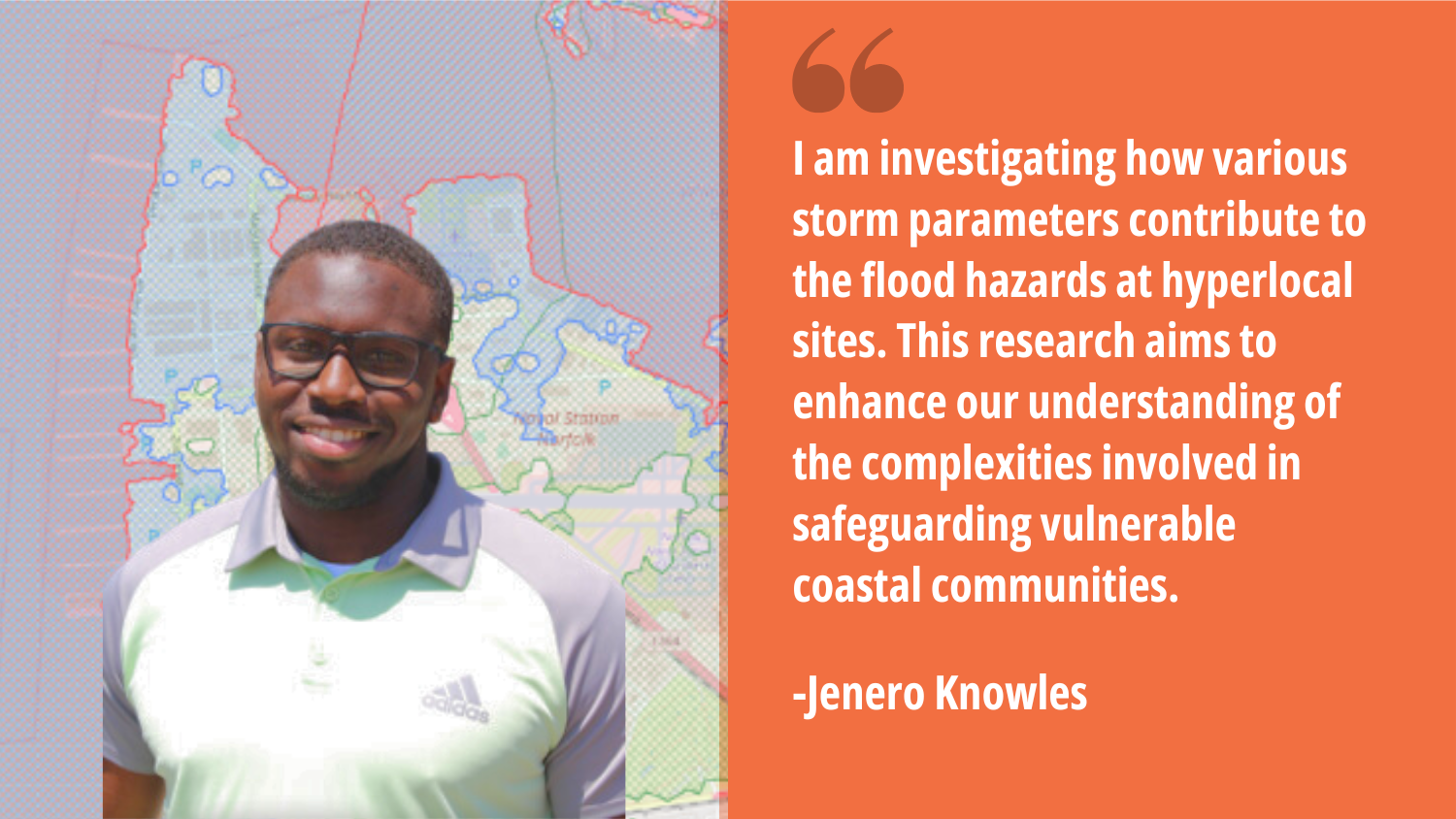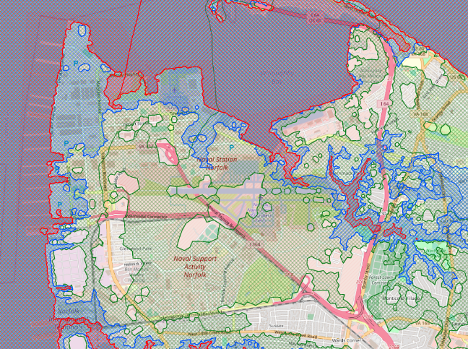CCEE Ph.D. student Jenero Knowles, advised by Associate Professor Casey Dietrich, is a 2023-24 Global Change Research Fellow. He was recently interviewed by the Southeast Climate Adaptation Science Center on his research and experience as a fellow.

About You
What do you study?
I study coastal engineering and my primary focus is storm surge modeling. I am investigating how various storm parameters contribute to the flood hazards at hyperlocal sites. This research aims to enhance our understanding of the complexities involved in safeguarding vulnerable coastal communities.
What (or who) influenced you to go into this field of study?
Following the completion of my undergraduate studies at South Dakota State University, I embarked on a professional journey as a Drainage and Hydraulics engineer in Orlando, Florida. Engaging in diverse projects, I conducted drainage studies in both coastal and inland basins in Central Florida. This experience fueled my curiosity about how computational models delineated flooding impacts. Some of those models would be used to determine base elevations for buildings and roadways but varied among complex geomorphologies. Intrigued by the intricate interplay of different shorelines on inland flooding, I decided to pursue a degree in coastal engineering.
What do you think is the most pressing issue related to global change?
In my view, two pressing concerns are social inequality and science communication. The disproportionate impact of climate change on vulnerable populations, often with lower socio-economic status, underscores challenges in adapting to and recovering from climate-related disasters. Despite ongoing efforts to enhance the presentation of scientific research to the public, it is imperative for science communication to serve as a conduit between the scientific community, policymakers, and the public. This role is pivotal in fostering comprehension, collaboration, and informed decision-making essential for addressing and mitigating the multifaceted impacts of global change.

About Your Research
What results are you finding?
In my research, I am enhancing the computational model efficiency and improving the storm surge accuracy, specifically tailored for a single location or a very small site. Typically, storm surge models are used to make predictions over very large scales without considering the impacts of different storm parameters at that specific location or hyperlocal site. Storm parameters such as the radius of maximum wind speeds, the magnitude of central winds speed, and the variability of storm track all impact the peak storm surges from hurricanes but are intensified when coupled with the effects of sea level rise. My objective is to identify the most severe storm scenarios for coastal communities vulnerable to the substantial impacts of global sea level rise.
Who will benefit from your research?
The outcomes of my research will provide valuable insights for managers, designers, and planners invested in fortifying the protection and resilience of coastal properties and critical infrastructure. The findings will not only inform subsequent simulations but also aid decision-makers in identifying strategies to enhance the safeguarding of coastal properties and homes.
How would you describe your research to a 3rd grader?
When storms occur, water is pushed along the beach and can cause flood damages to many buildings and roads nearby the beach. Different storms can cause the water levels to be higher or cause the water to stay around the houses much longer. That can depend on how fast the storm is moving, how big the storm is and how fast the winds are blowing. My research is to find out what kind of damage would occur to one house in a neighborhood from the worst storm possible. I’m building a computer program to determine what is the worst storm by making fake storms and looking at what happens at that home. Sometimes the water is higher, and sometimes the entire yard is full of water. Sometimes the water is there for a very long time after the storm passes. I’m trying to find which scenario would be the worst for this house.
About Your Global Change Research Fellow Experience
How do you expect the SE CASC Global Change Research Fellows Program to impact you and your work?
The SE CASC Global Change Research Fellows Program has already left a lasting imprint on my work. It has prompted me to consider the broader implications of my research on others and has inspired me to explore innovative ways of sharing and delivering results that ensure accessibility and understanding for a wider audience. Engaging in this program has been instrumental in shaping my perspective on the potential impact of my work beyond the immediate research community.
What advice would you give to a student that is interested in getting involved in your field?
For aspiring coastal engineering students, a robust foundation in civil engineering is crucial. Gain hands-on experience through internships, network with professionals, and consider interdisciplinary studies to broaden your perspective. Specializing in areas like coastal processes and engaging in relevant research projects can enhance your career. Advanced degrees, strong communication, and teamwork skills are essential. Develop resilience to handle environmental challenges and maintain a passionate commitment to making a positive impact. Coastal engineering is dynamic; continuous learning and adaptation, including interdisciplinary approaches, are key for success.
What has been the most rewarding part or your favorite part of being a SE CASC Global Change Research Fellow?
As a SE CASC Global Change Research Fellow, the most rewarding aspect for me has been the invaluable opportunities for collaborative research and networking. Engaging with a community of experts and learning from guest lecturers has broadened my understanding of global change issues. The fellowship provides a platform to contribute meaningful research with real-world implications. Building connections with fellow researchers, mentors, and professionals has created a supportive and enriching environment. Overall, being a Global Change Research Fellow has been a personally fulfilling experience, offering unique insights and opportunities for professional growth.
Learn more about the Southeast Climate Adaptation Science Center’s Global Change Research Fellows program.
This story first appeared in Southeast Climate Adaptation Science Center News.
